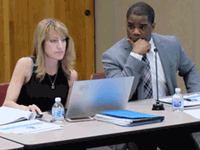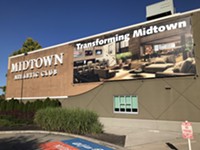[
{
"name": "500x250 Ad",
"insertPoint": "5",
"component": "15667920",
"parentWrapperClass": "",
"requiredCountToDisplay": "1"
}
]
"There was no way we could have predicted this kind of catastrophe." --- Homeland Security Secretary Michael Chertoff.
While we send money to help the victims; while doctors and nurses treat the injured, the ill, the traumatized; while the displaced mourn their losses and continue their frantic search for loved ones; while law enforcement officers guard the city, and search teams find and dispose of the dead, and other workers begin the arduous task of cleanup and restoration, it is time to study the history, old and recent. It is time to draw conclusions, and accept the hard lessons.
Michael Chertoff is flat wrong. There not only was a way we could have predicted the Katrina catastrophe, it was predicted, for years. Repeatedly.
Worse: Had we acted on what we knew, we could have prevented much of the pain, suffering, and loss of life and property that New Orleans is experiencing now.
The easy out is to say that we can't stop hurricanes. Leave aside the growing concern among some scientists that global warming is changing, for the worse, the patterns and intensity of hurricanes. We have made choices in the past that made the impact of this particular hurricane, on this particular city, worse.
The levees and canals that were built to benefit shipping and prevent flooding have prevented the normal deposit of silt onto the land, causing the city to sink. It is sinking still. And the harnessing of the Mississippi has had another effect: It has prevented silt from replenishing the wetlands in the southern part of Louisiana; in better shape, they would have absorbed some of the energy from the storm and the surge.
None of that has been a secret. Nor has the threat to New Orleans. In 2002, the city's daily newspaper, the Times-Picayune, ran a five-part, award-winning series spelling out exactly what would happen if a storm of Katrina's magnitude struck New Orleans. National Public Radio ran a similar series. The New York Times spelled out the danger.
Army Corp of Engineers in New Orleans knew this well, and they pled for help. A year ago, an article commissioned by the Association of Alternative Newsweeklies detailed the cutbacks to the FEMA budget and the administration's penchant for privatizing --- and for pushing down to the states the responsibility for dealing with disasters. The article quoted emergency specialists who warned that administration policies "are sapping FEMA's long-term ability to cushion the blow of hurricanes, floods, tornados, wildfires, and other natural disasters."
Instead, the president and Congress slashed funds for storm protection in New Orleans.
And so when the storm that New Orleans feared hit, the water poured in. And subsequent government dithering and denial resulted in unimaginable tragedy.
It is not playing politics to note the misdeeds that led to this. And it is indeed the time to point fingers, to demand answers, to rage until there is accountability --- and change. Because lives have been lost needlessly. And because other storms will come. And because San Francisco waits for its own Category 4 calamity. And because the aftermath of Katrina has shown what could lie in store for us if there is another terrorist attack in the United States.
Two short weeks before the fourth anniversary of 9/11, a trauma in which police and fire units could not talk to one another because their radios couldn't communicate with each other, officials in New Orleans could not talk to one another --- because their radios couldn't communicate with each other.
A city in which, according to the New York Times' Jason DeParle, 35 percent of black households and 15 percent of white households don't own a car, the evacuation plan called simply for people to get in their cars and get out of town. There was no plan for evacuating the poor --- or the tourists on whom the city's economic health depends so heavily.
Four days into the suffering in New Orleans, the head of Homeland Security insisted that he didn't know there were thousands of people sheltered at the convention center. The president brags that he doesn't read newspapers, but don't these people even watch television?
The federal government that is to help us deal with terrorist attacks at home and all manner of challenges abroad could not get troops to New Orleans for five days, could not get help to the ill, the dying, the newborns in hospitals where doctors had been pleading for help for days.
"We expected to see the skies full of helicopters on Tuesday," a doctor at one hospital told National Public Radio.
As with so much in this country, there is a racial aspect to this tragedy. It is not just that most of the victims we saw on television were African America. It is why that is so. This country's racial divisions, and its inability to heal them, have resulted in poverty that disproportionately affects African Americans in New Orleans and in other cities. The poverty that trapped much of New Orleans' blacks as Katrina bore down is a poverty that the more affluent respond to with, at best, hand-outs, and at worst, blindness. For days, the New Orleanians needing help were invisible to federal government officials. That is nothing new; the poor, particularly poor non-white Americans, are invisible to much of America --- unless they erupt into violence.
Now this great American city lies crippled and in distress. But so many Americans do not love cities anymore. Do not like them. Flee them, and flee --- if not purposely, nevertheless in fact ---the problems of cities. And in fleeing, magnify those problems.
In an op-ed piece in Sunday's Times, novelist Anne Rice said New Orleanians will return and will rebuild. "But," she added, "to my country, I want to say this: During this crisis you failed us. You looked down on us; you dismissed our victims; you dismissed us. You want our Jazz Fest, you want our Mardi Gras, you want our cooking and our music, Then when you saw us in real trouble, when you saw a tiny minority preying on the weak among us, you called us 'Sin City,' and turned your backs."
How to help
Disaster-aid officials are urging concerned people to help Katrina victims principally by donating money. Among the numerous organizations collecting funds is the Red Cross. You can make an online donation at www.redcross.org, or to the Rochester-area Red Cross, www.RochesterRedCross.org; or call 241-4420.
Speaking of...
-

Now's a good time to talk about FEMA cuts
Nov 1, 2012 -

Present Tense 9.7.05
Sep 7, 2005 - More »
Latest in Columns
More by Mary Anna Towler
-

Police reform: advocates on what should come next
Oct 22, 2019 -

Court clears the way for Police Accountability referendum
Oct 17, 2019 -

Dade outlines initial actions on district deficit
Oct 9, 2019 - More »





